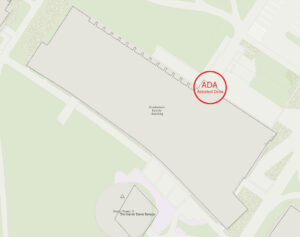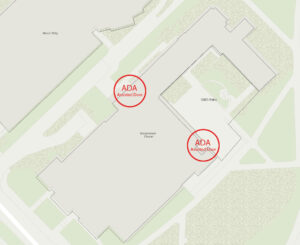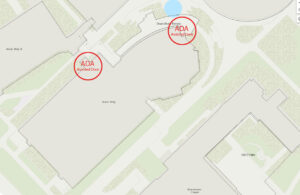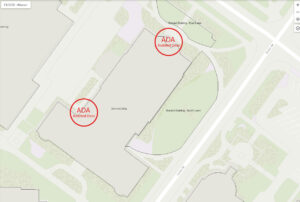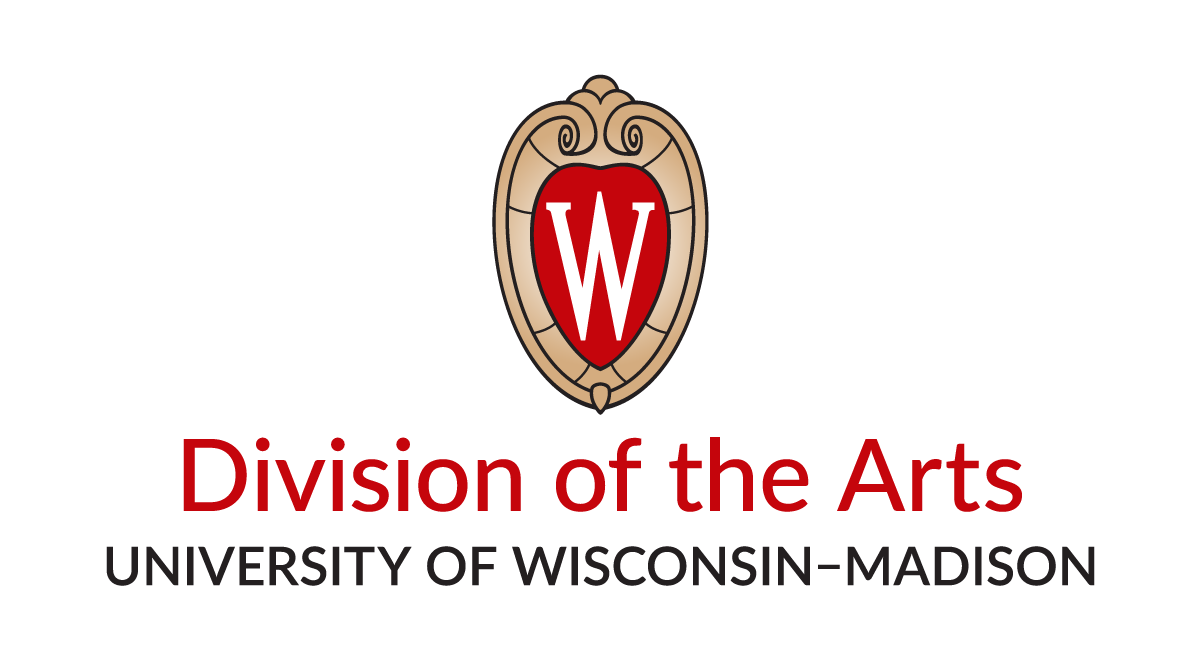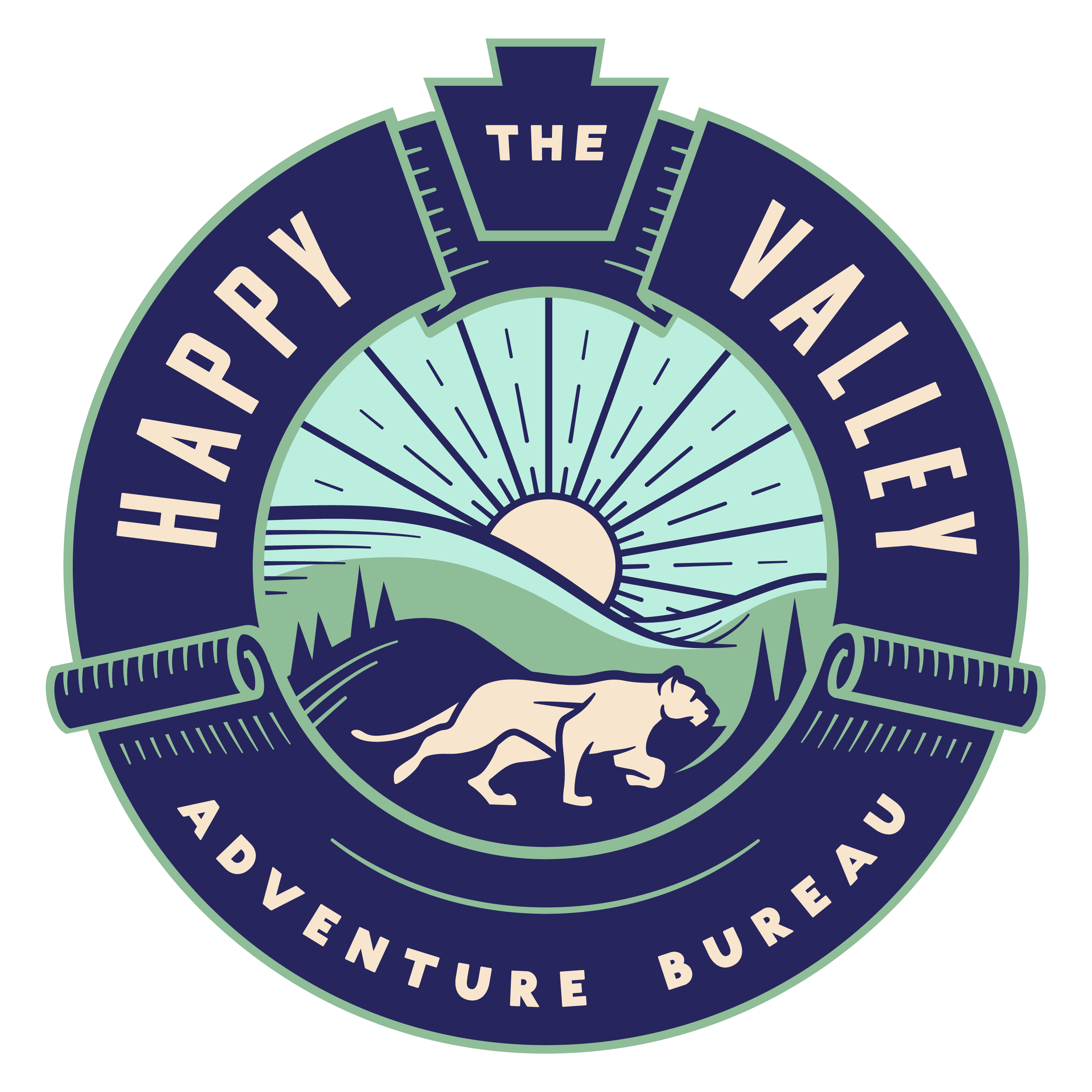2023 National Conference: “What’s Next?: Imagining New Educational Futures for Ourselves, Our Communities and Our Planet”
About the Conference
View the 2023 Conference Video Archive (Conference Participants Only)
If you attended the conference (in person or virtually) and did not receive an email with the password, please contact us at a2ruconnect@umich.edu.
a2ru’s next national conference will take place from October 19 – 21, 2023 at Penn State University’s University Park campus.
The a2ru national conference is an opportunity for practitioners and researchers from across the higher education spectrum to share innovations and perspectives in the arts. a2ru advances the full range of arts- and design-integrative research, curricula, programs, and creative practice to acknowledge, articulate, and expand the vital role of higher education in our global society. a2ru’s work, in partnership with an international network of leading higher education institutions, envisions a world in which universities—students, faculty, and leaders—explore, embed, and integrate the arts in everyday practice and research.
Virtual Registration includes access to the following events:
Thursday, October 19
9:00-9:30am: Welcome
9:30-10:45am: Social Justice & Equity and Health & Wellness Keynotes
11:15-12:45: Session 1
1:45-3:25pm: Theme Exploration Sessions: Social Justice & Equity
4:00-5:00: Session 5
Friday, October 20
9:00-10:15am: Session 9
10:35am-12:15pm: Theme Exploration Session: Health & Wellness
12:30-1:30pm: NeuroArts Blueprint Initiative: Mapping the Path Forward
2:15-3:30pm: Sustainability and Evolving Technologies Keynotes
4:00-5:30pm: Session 13
Saturday, October 21
9:00-10:30am: Session 17
11:00am-12:15pm: Final Keynote Discussion
12:30-12:45pm: Closing Remarks
For full session details, please see the conference schedule.
Please note that the deadline for virtual registration is Sunday, October 15.
The Theme
The study, practice, and centrality of the arts in higher education are inextricably linked to our ever-changing social, cultural, political, and environmental landscape. These changes force us to re-evaluate old mechanisms and ideas to meet the challenges of an uncertain future. How are students, faculty, institutional leaders, and institutions grappling with this uncertainty? How have creative communities addressed regressive responses to social justice, the looming consequences of climate change, and concerns with equitable values as new technologies evolve? How are we managing to maintain healthy bodies and minds for ourselves and for communities both within and outside the educational project-at-large?
What’s Next? Imagining New Educational Futures for Ourselves, Our Communities, and Our Planet, will feature sessions that present and explore new modes or models of practice, pedagogy, programming, research, and community partnerships that respond to our present moment and imagine educational futures that have the potential to positively impact global communities through the arts.
Featured Speakers


Julian C. Chambliss is a Professor of English and the Val Berryman Curator of History at the MSU Museum at Michigan State University. In addition, he is a co-director for the Department of English Digital Humanities and Literary Cognition Lab (DHLC) and a core participant in the MSU College of Arts & Letters’ Consortium for Critical Diversity in a Digital Age Research (CEDAR). His research focuses on race, culture, and power in real and imagined spaces. He is an interdisciplinary scholar who has curated museum exhibitions, art shows, and public history projects. His recent comic research included Assembling the Marvel Cinematic Universe (2018) and his MSU Museum exhibition, “Beyond the Black Panther: Visions of Afrofuturism in American Comics” (2021). He also serves as faculty lead for Comics as Data North America (CaDNA), an ongoing collaborative project at Michigan State University that uses library catalog data to explore North American comic culture. His recent digital humanities projects “Days of Future Past: Why Race Matters in Metadata” (2022) and Making Sense of Digital Humanities: Transformations and Interventions in Technoculture (2022) He has curated several exhibitions examining Afrofuturism and visual culture, including Transfiguration: A Black Speculative Vision of Freedom at Philip and Patricia Frost Art Museum at Florida International University and A Past Unremembered: The Transformative Legacy of the Black Speculative Imagination at the Zora Neale Hurston National Museum of Fine Arts. He was featured on the Terrestrial Space Panel at the Smithsonian National Air and Space Museum, Claiming Space Symposium in 2022. His documentary exploring contemporary Afrofuturism, “Afrofantastic: The Transformative World of Afrofuturism,” is available through PBS.org.


Lara Fowler is a mediator, attorney, and law faculty member who focuses on water, energy, agriculture, and dispute resolution. On July 1, 2022, she became the interim Chief Sustainability Officer for Penn State, as well as the interim Director of the Penn State Sustainability Institute.
Lara has a long background in environmental issues, particularly water and dispute resolution. Prior to joining Penn State in 2012, she worked on public policy issues for the Oregon Water Resources Department, attended the University of Washington School of Law, and practiced with Gordon Thomas Honeywell LLP from its Seattle, Washington office. As a private practitioner, she worked on a number of projects that brought stakeholders, science, and the law together with a focus on finding workable solutions. For example, she helped facilitate discussions on how to address chronic flooding issues in Washington State’s second largest river basin, mediated challenging water issues in California and Oregon, and counseled private clients on various regulatory matters, both water and energy related.
She now wears multiple hats: as Penn State’s Chief Sustainability Officer, as the Director of the Penn State Sustainability Institute, as a Professor of Teaching at Penn State Law, and as an affiliate faculty member of Penn State’s School of International Affairs. Prior to taking the sustainability leads in July 2022, she was the Assistant Director for Outreach and Engagement with Penn State’s Institutes of Energy and the Environment. Lara teaches water law; energy law; negotiation and dispute resolution design; and mediation of environmental and public conflicts.
Her research focuses on how water, energy, and ways of managing conflict play out in a region that includes the Chesapeake Bay, agriculture, flood-prone rivers, biofuels and other types of energy development. Lara is on the Chesapeake Bay Program’s Scientific & Technical Advisory Committee, is a juror for the Stockholm International Water Institute’s Junior Water Prize and was a Fulbright Scholar in Sweden from 2019-2020.


Tonika Johnson is a photographer, social justice artist and life-long resident of Chicago’s south side Englewood neighborhood. Her art explores urban segregation and celebrates the nuanced richness of the Black community, countering media depictions of Chicago’s violence. Tonika’s work reveals injustices and inequities, past and present, evidenced in the built environment and enshrined in real estate and land use practices, including historic preservation. Her Folded Map Project™ brings residents who live at similar addresses but miles apart on Chicago’s racially segregated South and North sides together in conversation about the city’s racial and economic divides. The Folded Map Project™ questions how everyone is socially impacted by racial and institutional conditions segregating the city and challenges viewers to contribute to a solution.
Tonika was selected as the National Public Housing Museum’s 2021 Artist as Instigator to expand her investigation through “Inequity for Sale,” a project highlighting the living history and legacy of greater Englewood homes sold through Land Sale Contracts in the 1950s and 1960s, which led to the unscrupulous loss of people’s homes and equity preventing the generational transfer and building of Black wealth. In 2022, Landmark Illinois’ named her one of their Influencers for her “Inequity For Sale.” Tonika’s artistic contributions have gained citywide recognition in the last seven years, including being named a 2017 Chicagoan of the Year by Chicago Magazine, being exhibited at the Museum of Contemporary Art, the Rootwork Gallery in Pilsen, the Chicago Cultural Center, the Harold Washington Library Center and at Loyola University’s Museum of Art. She is a 2019 Field Foundation “Leader for a New Chicago” and a Chicago Department of Cultural Affairs and Special Events Cultural Advisory Council member. Tonika co-founded Resident Association of Greater Englewood in 2010 and the Englewood Arts Collective in 2017. She now serves as the Creative Executive Officer of the Folded Map Project™ nonprofit organization. Visit her www.tonikaj.com to learn more.


David Sloane is a professor in the USC Sol Price School of Public Policy where he is chair of the Department of Urban Planning and Spatial Analysis. He studies and teaches about socially engaged art, cultural landscapes, mourning/commemoration, and community health planning. He is best recognized as a leading expert on the history and contemporary issues in mourning, commemoration, and public space. His first book, The Last Great Necessity: Cemeteries in American History (1991), has been called a classic in the field. His recent book, Is the Cemetery Dead? (2018), explores current innovations in commemoration. He is an acknowledged expert on urban planning, having edited the multi-authored book Planning Los Angeles (2012). He has recently collaborated with urban scholar Brettany Shannon and artist Anne Bray to complete Co-Creative Placekeeping in Los Angeles: Artists and Communities Working Together (forthcoming from Routledge, 2023) that explores the role of artists protecting communities by working with them co-creatively.
Sponsorship Opportunities
Support the a2ru conference by becoming a sponsor! Click below for options, starting at just $300 and with a range of benefits including discounted or complimentary registration. For more information or to customize a sponsorship package to meet your organization’s needs, please contact a2ru Conference Director Charisse Willis at a2ruconnect@umich.edu.
Hotels
Click below to see rates and booking information on negotiated room blocks in local hotels for the 2023 conference. Please note deadlines for booking.
Conference & Registration Policies
Registration Policies
Payment Methods
Single-ticket purchases made by individuals must be made by credit card, using the a2ru.org website.
A university representative wishing to make multiple-ticket purchases for a group of more than 5 people can request an invoice to be paid by credit card, check, or wire transfer. Registration is not confirmed or reserved until full payment is received, and invoices will not be issued after October 1, 2023. Please contact a2ru Conference Director Charisse Willis at a2ruconnect@umich.edu to request an invoice for payment.
Financial Security
For your financial safety, we cannot accept registrations with a credit card number via e-mail or phone.
Registration Categories
Undergraduate Students – Students currently enrolled in a bachelor’s or associate’s program at any educational institution. Part-time students are eligible.
Graduate / Post-doc Students – Students currently enrolled in a master’s degree or higher program at any educational institution. If the student has received their PhD, they must currently be enrolled in a post-doctoral program at an educational institution. Part-time students are eligible.
Contingent/Independent – Contingent faculty, independent artists, performers, and scholars. Staff with no institutional support as well as retired/emeritus faculty are also eligible for this category.
Individual – Everyone else!
Member v. Non-member – Members include individual members and the students, staff, faculty, and administration who are currently enrolled and/or employed at our member institutions.
Cancellation Policy
Refunds
Registrations are non-refundable.
In the event that a2ru must cancel the conference in its entirety due to circumstances beyond the control of a2ru or venues hosting the event, a2ru may refund the appropriate registration fees to conference registrants. Cancellation of the event in its entirety would only occur for reasons including but not limited to, forces of nature and natural disasters, war, government regulations, sequestration, travel advisories, outbreaks of disease, acts of terrorism or threat of terrorism, disaster, strikes, civil disorder, curtailment of transportation facilities, or other emergencies that make it inadvisable by local, state or federal government officials, illegal or impossible to provide the facilities or to hold the event. Refund requests after the event due to a no-show will be denied.
Under no circumstances will refunds be made for travel expenses related to the conference. Attendees who purchase non-refundable airline tickets do so at their own risk.
Please check with hotels and transportation directly regarding their cancellation policy. Requests to cancel must be made directly with the hotel or transportation company.
Transfers
Transfer to an Individual: A one-time transfer of a paid registration can be made within the same membership category. Before September 1, 2023, a $30 administrative transfer fee will be assessed. From September 1 – October 5, 2023, a $50 transfer fee will be assessed. No transfers will be made on or after October 5, 2023. All transfer requests must be submitted in writing via e-mail to the a2ru Conference Director Charisse Willis at a2ruconnect@umich.edu. If the original registrant requested or if the new registrant requires accommodations for dietary restrictions or disabilities, please note this in the request. While we will do our best, we may not be able to accommodate certain requests conveyed after certain accommodations may not be able to be made for requests conveyed after August 15, 2023.
Transfer Registration to Different Event Format: A one-time transfer of a paid registration from in-person to the virtual ticket or virtual ticket to in-person can be made. Before September 1, 2023, a $30 transfer fee will be assessed. From September 1 – October 5, 2023, a $50 transfer fee will be assessed. No registration transfers will be permitted after October 5, 2023. It will be the participant’s responsibility to secure travel and hotel. a2ru will not be responsible for cancelled travel or lodging accommodations.
COVID Policies and Protocols
a2ru will follow all Pennsylvania State University COVID-19 policies that are in place at the time of the conference. At this time, masking is not required on campus. Attendees can view Penn State COVID policies and up-to-date data on case numbers at the Penn State Coronavirus Information website. Data for the area surrounding campus can be accessed at the CovidActNow website.
a2ru strongly encourages all conference attendees to be up-to-date on COVID vaccinations and applicable boosters. All non-vaccinated individuals should take a rapid test before attending each day of the conference. Masks are welcome at all conference events, and we will have masks and hand sanitizer available for your use. Non-vaccinated individuals are strongly encouraged to wear masks during the conference.
We have created a virtual registration option to ensure our offerings are inclusive to those who are immunocompromised or do not wish to attend large in-person gatherings at this time.
The conference will proceed unless Penn State University decides in-person events must be canceled. As we have rented university buildings for the event, we will face severe financial penalties without an external injunction to free us from our contracts. Should the University cancel, we will switch to a virtual event. Attendees/Presenters will have the option to receive a partial refund (the difference between an in-person and virtual ticket) or to donate the difference in ticket cost to the Alliance.
Please Note: This is a Fragrance-Free Event
a2ru wants all event attendees to feel welcome. The chemicals used in scented products can make some people sick, especially those with asthma, migraines, seizures, and other medical conditions. Please refrain from wearing and using fragrances during the conference.
Video and Photo Release
Please note that a2ru will be taking photographs and shooting video throughout the Annual Conference. These photographs and video may be used in publications, including electronic publication, or in audio-visual presentations, promotional literature, advertising, or similar ways. By participating in this event, you voluntarily consent to be recorded and/or photographed a2ru.
Time Zones
State College, PA is in the Eastern time zone, and all times listed should be considered EST.
Code of Conduct
All attendees, speakers, and volunteers at our conference are required to agree with our code of conduct. You can download it below.
FAQs
Acknowledgements
a2ru thanks the following individuals at Penn State who have made this year’s conference possible:
Mallika Bose (Associate Dean for Research, Creative Activity, and Graduate Studies, College of Arts and Architecture)
B Stephen Carpenter II (Michael J. and Aimee Rusinko Kakos Dean, College of Arts and Architecture)
Conference Organizing Committee:
Mihyun Kang (Director for Sustainability in the College of Arts and Architecture)
Zsuzsanna Nagy (Arts Manager)
Tracie Mehalick (Assistant to the Associate Dean)
Ankita Karmakar (Graduate Research Assistant)
Kate Domico (Assistant Dean for Administration and Information Technology)
Amy Milgrub Marshall (Editorial Director, A&A Marketing & Communications Office)
Scott Tucker (Creative Director, A&A Marketing & Communications Office)
Matthew J. Olson (Facilities Manager)
Conference Planning Committee:
Folayemi Wilson (Associate Dean for Access and Equity, College of Arts and Architecture)
Sita Frederick (Director, Center for the Performing Arts)
William Doan (Director, ADRI—Arts & Design Research Incubator)
Huiwon Lim (Assistant Professor of Graphic Design)
Bonnie Collura (Professor of Art)
Lisa Domenica Iulo (Associate Professor of Architecture, Director of the Hamer Center for Community Design)
Stephanie Nimick (Lecturer in Theatre)
Marc Miller (Assistant Professor of Landscape Architecture)
Brandi Breslin (Museum Educator, Palmer Museum of Art)
Spaces provided by the School of Music and the Stuckeman School’s Department of Architecture.

